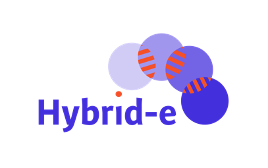Date and time: 14 May, 2024, 10:00 – 16:00 CEST
Title: Future of Learning: Hybrid Learning Models, Metacognition Skills, and Generative AI Shape Educational Outcomes
Where: Room U1, Brinellvägen 26. KTH main campus, Stockholm
Directions: https://www.kth.se/places/room/id/a97c7287-81cb-470d-bd01-2db4da7ca98d
Zoom: https://kth-se.zoom.us/j/68744167461
Meeting ID: 687 4416 7461
The lectures are free of charge, but we ask that you register in advance at the link below: https://forms.gle/LR18LFe174SPBxEi7
PROGRAM
Morning Session
09:30 10:00 Fika and Cakes
10:00 – 10:15 Insight from the Hybrid-E project, Olga Viberg, Associate Professor, KTH Royal Institute of Technology, Digital Futures Faculty and Anouk Tso, University of Amsterdam. More details about the project can be found here: https://www.ucd.ie/hybrid-e/projectresults/
10:15 – 10:30 The Future of Hybrid-e Practice, David Jennings, University College Dublin
10:30 – 11:05 Harnessing the virtual learning environment to support metacognitive learning in students, Emma J. O’Neill, PhD, Associate Professor, School of Veterinary Medicine, University College Dublin
Abstract:
To thrive in a rapidly changing digital society, students from all disciplines will require a broad set of core competencies, including critical thinking and problem-solving abilities along with the capacity to learn, un-learn, and re-learn effectively. Metacognition refers to students having self-awareness of their learning and the ability to self- monitor, control and purposefully direct their own approaches for lifelong learning (Tanner 2012), and is critical to achievement of these competencies. Hence, education strategies that foster metacognition offer significant impact.
The virtual learning environment (VLE) provides a valuable conduit to influence student learning outside standard class time in a way that is achievable with realistic levels of staff intervention. The Metacognition Design Framework is an evidence-based framework developed to scaffold teaching, learning, and assessment strategies that support metacognitive skill development in students through blended learning harnessing the VLE. This framework has been effectively trialed in broad a variety of educational settings within University College Dublin with very positive findings.
This presentation will explore the Metacognition Design Framework and ‘I-SEE’ learning strategies, highlighting the key features of this learning design and offering evidence of its potential impact in university education. It will also introduce “Metacognitive Teaching and Learning Strategies,” an open access learning resource available within the Brightspace Learning Centre, developed as an experiential learning resource for educators to showcase this learning approach within the VLE. Ongoing access to this resource will allow participants to continue exploring this topic at their own pace after the presentation.
More info can be found here: https://www.ucd.ie/cshe/metacognitivelearning/
References
- Education Endowment Foundation. (2018). Guidance report. Metacognition and self- regulated
learning. https://educationendowmentfoundation.org.uk/tools/guidancereports/metacognitionand-
self-regulated-learning/ - Oliver, R. (1999). Exploring strategies for on-line teaching and learning. Distance Education, 20(2), 240-254.
- Panadero, E., Andrade, H., & Brookhart, S. (2018). Fusing self-regulated learning and formative assessment: A roadmap of where we are, how we got here, and where we are going. The Australian Educational Researcher, 45(1), 13-31.
- Tanner, K.D. (2012). Promoting student metacognition. CBE-Life Sciences Education, 11, 113-120. Retrieved from https://www.lifescied.org/doi/pdf/10.1187/cbe.12-03-0033
11:05 – 11:25 Balancing Pedagogical Innovation and Bias in Generative AI Applications, Yael Feldman-Maggor, PhD, KTH Royal Institute of Technology, Post Doctoral Digital Futures Fellow.
Abstract:
Generative AI tools have become widely used over the past two years, enabling the creation of content across various formats, including images, audio, video, and text. Interaction with these tools typically involves a dialogue-based interface where users input queries or instructions via prompts. These tools vary in their level of human-machine interaction capabilities and the features they offer to support teaching and learning. They can facilitate the learning of new skills, assist in research, integrate various pedagogical approaches in educational activities, save time, and help in the development of skills based on scientific content. The choice of a particular tool often depends on its intended use. This lecture will explore different pedagogical aspects that can enhanced by generative AI . In addition to discussing the positive impacts of using AI in education, we will also address potential ethical concerns, such as ‘hallucinations,’ privacy issues, and biases that must be considered when employing these technologies.
11:25 – 11:30 Summary
Afternoon Sesssions during Stortraffen VT-24
12:00 – 12:30 Light Lunch
13:00- 16:00 Please, register here for the three Hybrid-E sessions, https://www.kth.se/form/stortraffen-vt24
The Hybrid-E sessions are:
- Discussion: Policy-utveckling för generativ AI inom högre utbildning / Policy development of generative AI in higher education
- Anouk Tso, University of Amsterdam
- David Jennings, University College Dublin
- Discussion: Ansvarsfull användning av digital teknik och studentdata inom högre utbildning / Responsible use of digital technologies and student data in higher education
- Emma Riese Phd, KTH Royal Institute of Technology
- Olga Viberg, Associate Professor, KTH Royal Institute of Technology, Digital Futures Faculty
- Learn more: Främja hybridinlärning inom högre utbildning / Facilitate hybrid learning in higher education
- Anouk Tso, University of Amsterdam
- Olga Viberg, Associate Professor, KTH Royal Institute of Technology, Digital Futures Faculty
Questions? Please contact Olga Viberg at oviberg@kth.se or Yael Feldman-Maggor at yaelfm@kth.se





